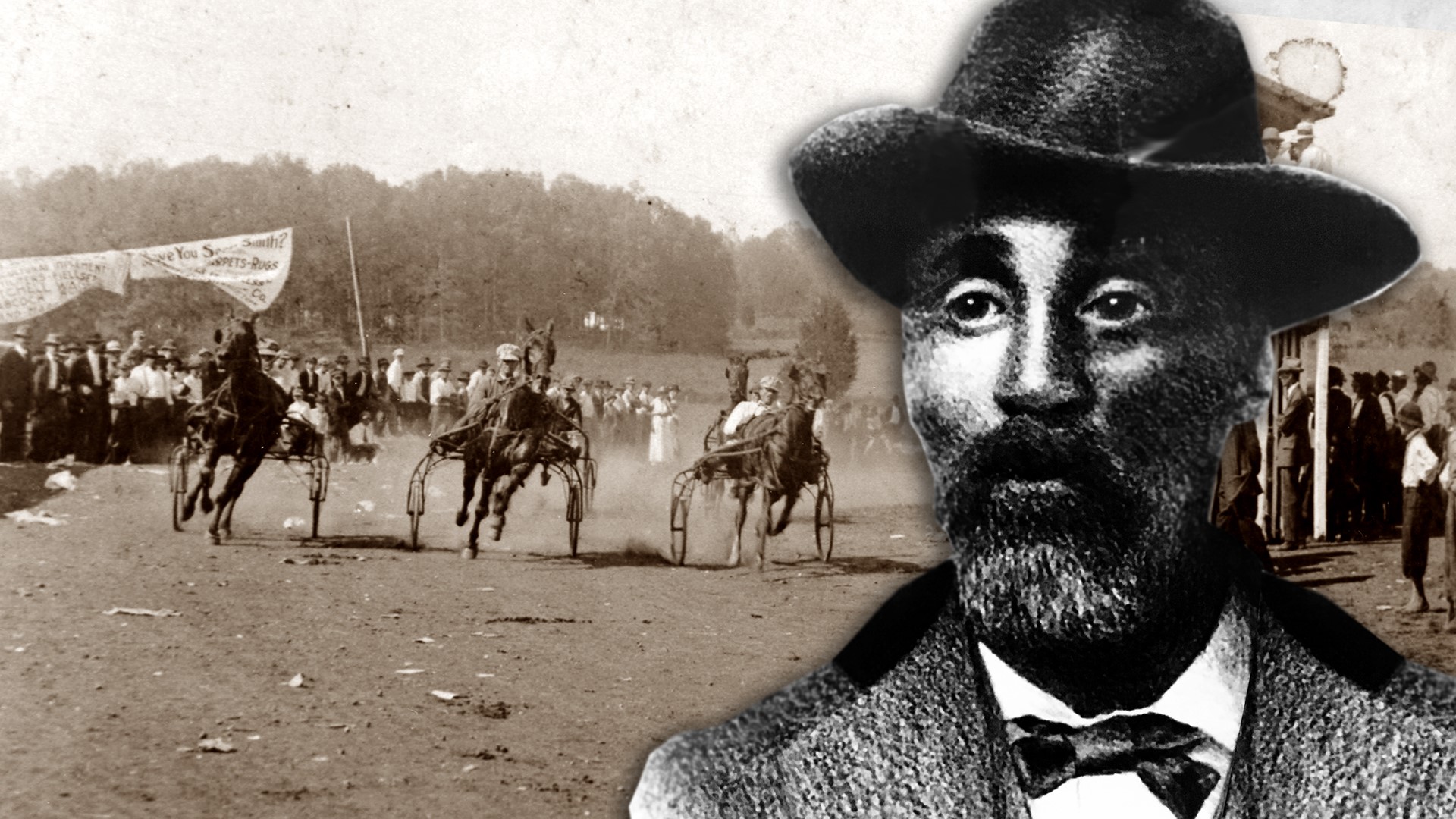KNOXVILLE, Tenn. — In the early decades of the event, East Tennessee was home to horse racing and the unmatched underdog story of Cal Johnson.
Cal Johnson was born a slave in 1844. When he died in 1925, Johnson was one of the wealthiest Black men in the South. He made a fortune as the owner of saloons, race tracks, and real estate holdings. Johnson was known as a gentleman who was quietly generous with his wealth.
Johnson's claim to fame beyond East Tennessee came from his ownership of some of the South's finest racehorses. Newspapers across the country covered his death with headlines that referred to Johnson as a "Negro Horse Owner" and "Wealthy Negro Horse Racer."

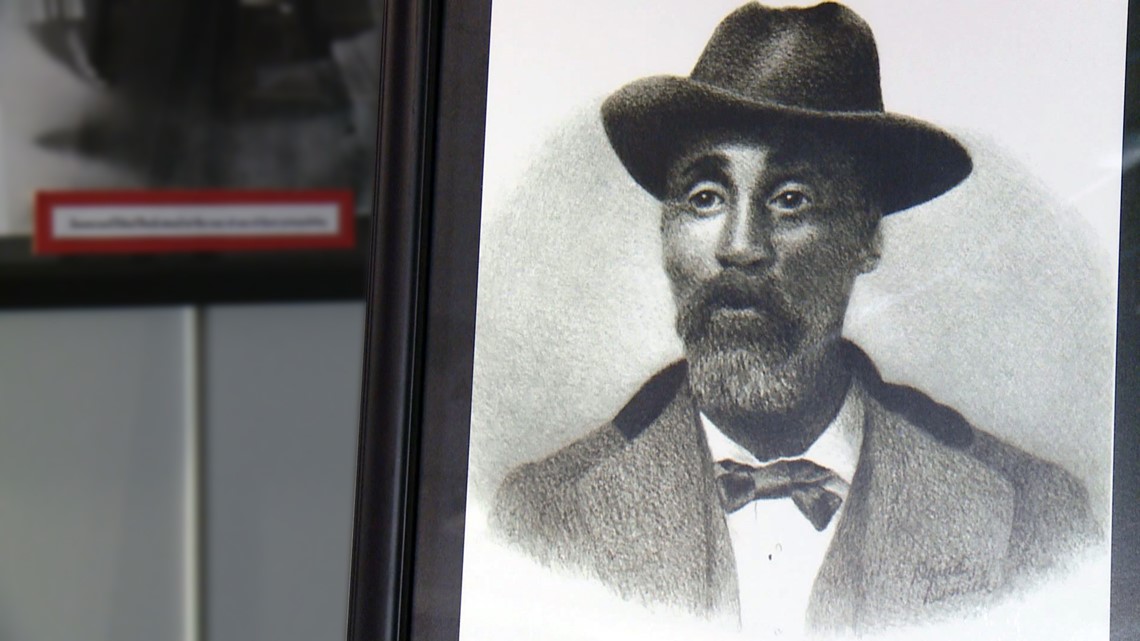
"It was very common in those days for Black men to race and ride horses. The first jockey to win the Kentucky Derby in 1875 was a Black man named Oliver Lewis. Around a dozen Black men were winning jockeys in the Kentucky Derby until after the turn of the century when Blacks were not welcome anymore," said Robert J. Booker, local historian and former director of the Beck Cultural Exchange Center. "It was much less common for a Black man to own expensive race horses like Cal Johnson did."
Cal Johnson's role in business and horse racing left a lasting impact on the landscape of Knoxville. Several buildings still bear his name and a neighborhood in East Knoxville was truly shaped by his love of horses.
"The street Speedway Circle was built on Johnson's horse track," said Booker. "There are people who don't know the neighborhood was a race track. Then you point out it is in the shape of an oval and they go, 'Oh, I see!' I get that [reaction] many times when I'm talking about Cal Johnson."

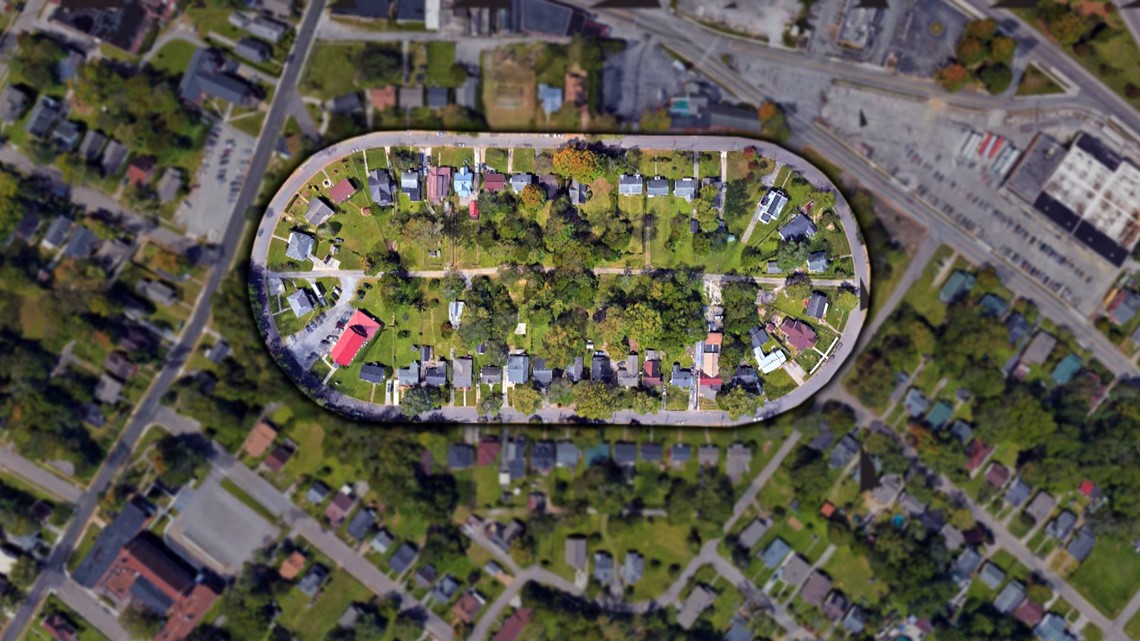
You can track Cal Johnson's success as an equestrian expert and entrepreneur to his formative years with his talented enslaved parents.
SLAVERY AT THE STARTING GATE
Cal Johnson's parents were slaves Cupid and Harriet Johnson. They were bought by the McClung family of Gay Street in Knoxville when their owner in Grainger County died.
Cal Johnson was born at the McClung property in Downtown Knoxville in 1844. As a young boy, he was sent to live and work on the McClung's farm in the Campbell Station area of West Knox County, now known as Farragut. He cared for his masters' horses and continued a family tradition of equestrian expertise.
"His father was a winning jockey, himself. Cupid Johnson rode horses throughout the area. Horse racing was in Cal Johnson's DNA," said Booker.

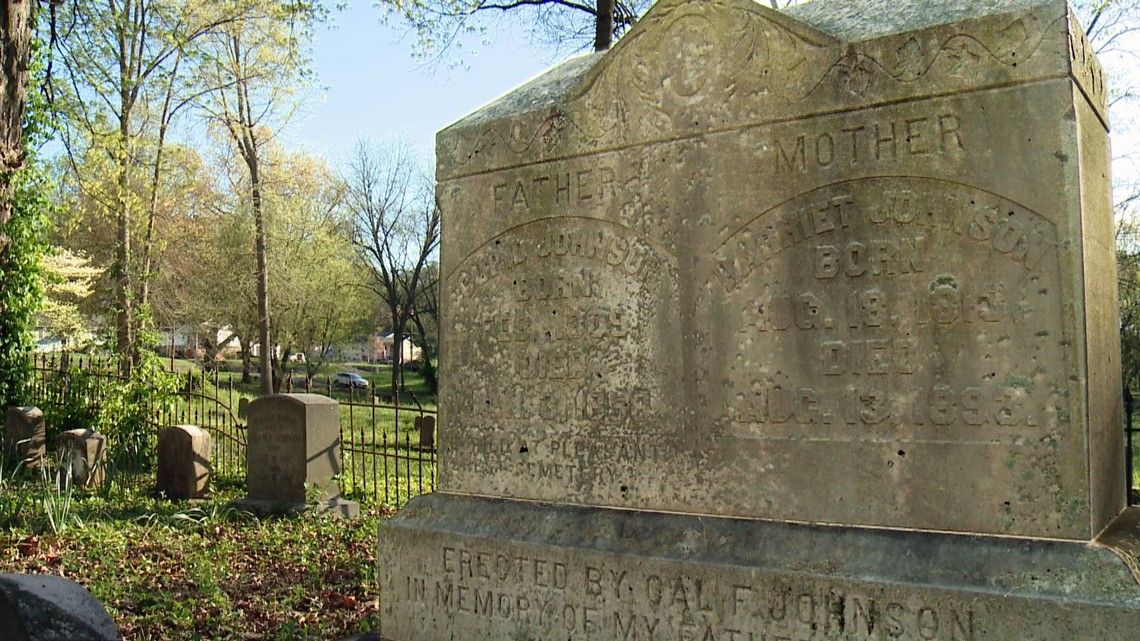
Harriet Johnson was a talented woman who demonstrated her keen business sense when the Civil War and slavery ended.
"Cal Johnson's mother was an entrepreneur. Shortly after slavery, she opened a restaurant. She opened what could be considered a motel or eating house. She had several of those businesses before Cal Johnson even got started with his career," said Booker.
When slavery was abolished, Cal Johnson was a 21-year-old free man with a chance to work and earn money for himself.
DIGGING DEATH AND KEEPING SALOONS
After the Civil War, Cal Johnson worked at a grocery store on Gay Street and saved enough money to make a down payment on a wagon and horses. He then literally dug his way through death to reach prosperity.
"He was awarded a federal contract to dig up the bodies of soldiers who were killed in the war. Then he reburied them in the national cemetery or in private cemeteries," said Booker. "He used that money to open several saloons in Downtown Knoxville. We know of three of them he operated until liquor was made illegal in the state of Tennessee."
Johnson's saloons served Blacks and whites. His first saloon the Poplar Log at the corner of Gay Street and Vine Avenue. Subsequent saloons in the chain were called branches of the Poplar Log.

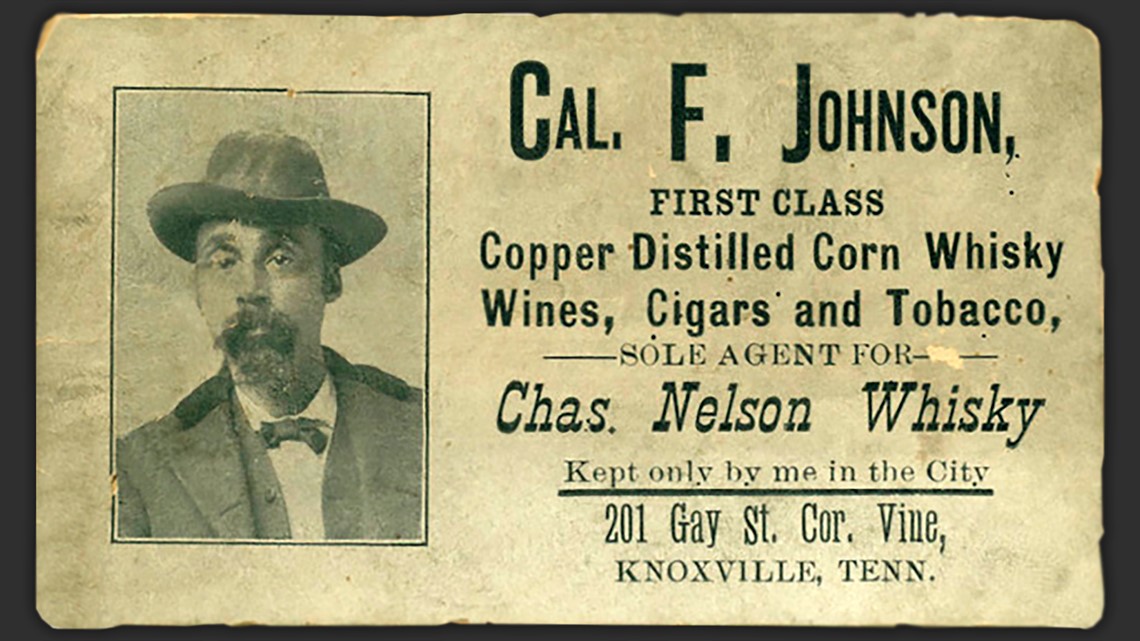
Johnson was known for his politeness and tact. He tipped his hat in public to both men and women. A 1926 Knoxville newspaper article said old-timers remember the Poplar Log as "one of the most decently conducted places in the city." It closed earlier than most saloons on Saturday nights and did not serve alcohol on Sundays. He did not sell liquor to minors or to customers who were already drunk.
Johnson could not read nor write until much later in life, but he was astute at business. He signed checks with a stamp and a scrawl. The banks always knew to honor his checks.
Cal Johnson invested his money in real estate. He constructed buildings at the corner of Vine and Central Avenues as well as the Cal Johnson building currently being restored on State Street. The buildings were used by businesses ranging from restaurants, attorney offices, shoe repair shops, and clothing factories. It is also where he had an office for his passion: buying and selling fine racehorses.
HORSEFLESH AND RACE TRACKS
When Cal Johnson began building wealth, the luxury item he coveted most was the animal he cared for as a child. Johnson loved fast horses and was renowned for his ability to quickly identify a good one.

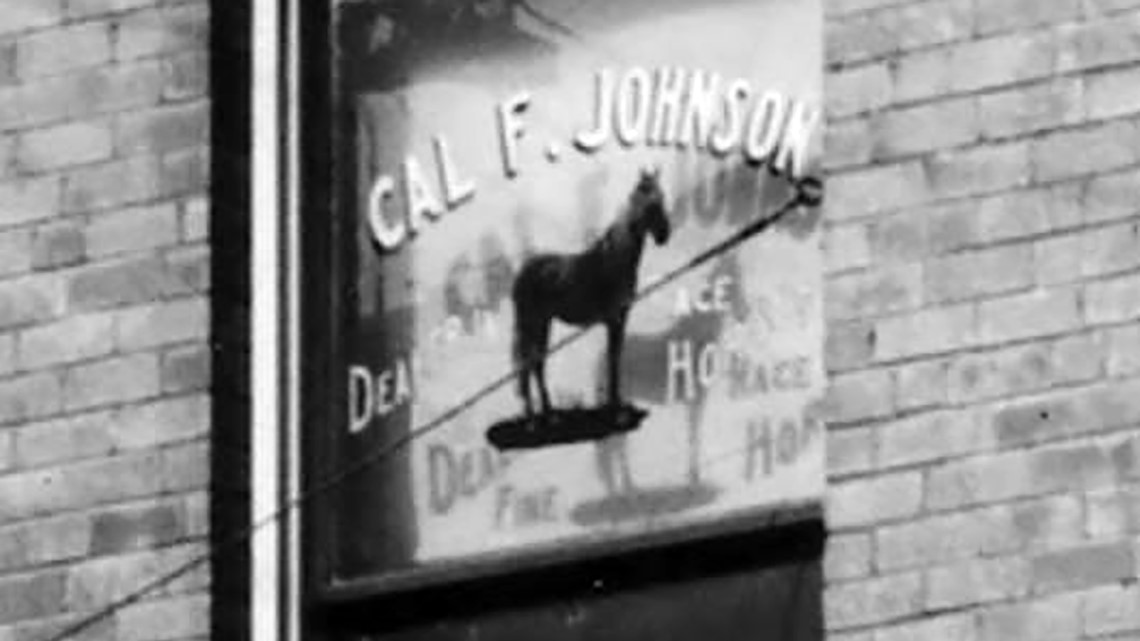
By the early-1870s, Johnson was buying racehorses and people knew it. A January 1874 article in the Knoxville Press and Herald reported a man stole a mare from a renowned breeder in Kentucky, brought the animal to Knoxville, and "under fair representations succeeded in selling her to Cal. Johnson" for $100. The animal was returned to its rightful owner in Kentucky.
As his riches rose, so did the prices of Johnson's horses. The Knoxville Sentinel in 1890 reported "the finest animal in the city is the property of Cal. F. Johnson, a wealthy colored citizen. This mare, called Linnette, was recently purchased from Col. R.P. Pepper's celebrated stables at Frankfort, Ky., at a cost of $6,000."
To put the $6,000 price in perspective, online inflation calculators indicate that's equivalent to spending $167,605 on a horse in 2019. Linnette was a record-setting trotter that won many races for Johnson. The 1890 article said Johnson "also has several other valuable horses, among which is Benson, a runner, valued at $4,000."
"He owned the finest string of racehorses in the South. His horses were the envy of horsemen around the area. He owned the horse 'George Condit,' which won awards in the 1893 Chicago World's Fair," said Booker.

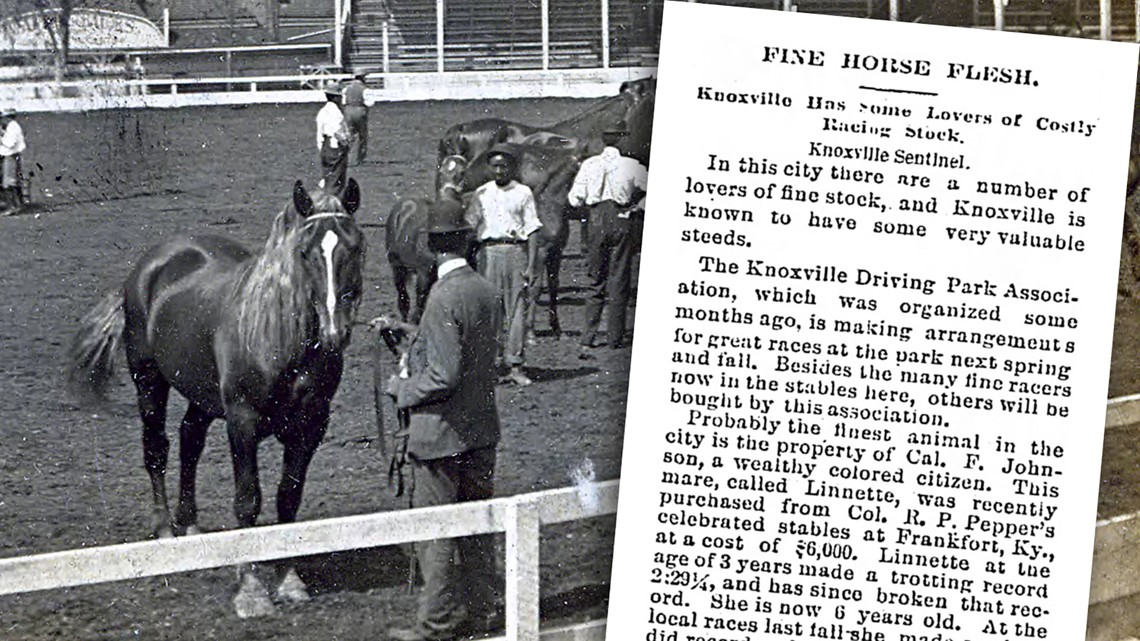
There were several horse tracks in East Tennessee, but the finest half-mile track was built by the East Tennessee Fair Association in 1896. The half-mile track was 60 feet wide and was off Rutledge Pike in the Burlington neighborhood a few miles east of Downtown Knoxville. Cal Johnson bought the track.
"People were interested in horse racing in this area. He bought the track that is now Speedway Circle and conducted races," said Booker.
Johnson also owned a track alongside the south side of the Tennessee River where the East Tennessee Packing Company was located on Sevierville Ave. Along with hosting events, the tracks made Johnson money as stables for owners to board their horses. Horse owner Oliver King was interviewed by the Knoxville News-Sentinel in 1952 and said, "I remember boarding my horses with Cal at that track. The charge was $1 a month per stall."
NEW CENTURY SADDLES BUSINESS
The first decade of the 20th century was unkind to Cal Johnson's business interests. The swelling temperance movement aimed to end alcohol consumption across the country. State legislators were repeatedly introducing bills to end gambling at horse races.
Despite the threats to his businesses, Cal Johnson maintained his polite and tactful reputation. A woman named Carrie Nation was gaining national recognition for attacking taverns with a hatchet to promote the temperance movement.
"It was in Cal Johnson's nature to be a gentleman. When Carrie Nation was going around busting up saloons, they asked what would happen if she came to his saloon. He said he would treat her like a lady and let her go about her business and not worry about it."

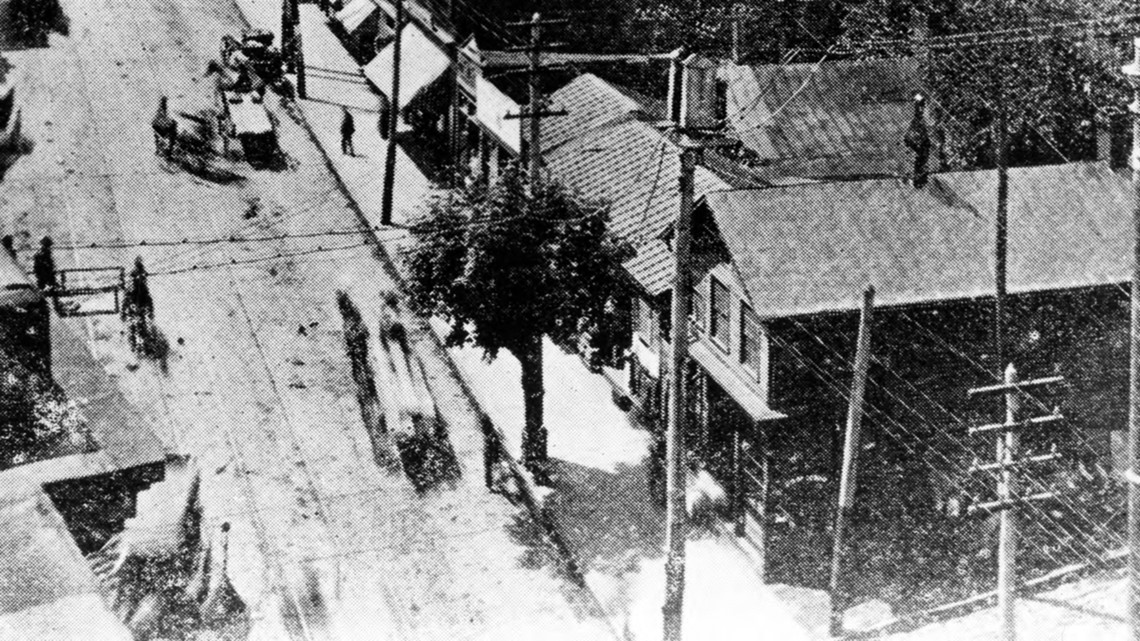
With telephone lines and cable cars beginning to choke the air above Gay Street in Knoxville, there was only one tree left on the entire street. It was in front of Cal Johnson's saloon, renamed the Lone Tree Saloon. Other businesses renting space in the building included Lone Tree Shoe Repair.
In 1907, Tennessee prohibited alcohol sales throughout most of the state. The Foust anti-gambling bill was also passed in Tennessee in 1907 and banned wagers at horse races.
"Much of his income was destroyed by those two state laws. Thank goodness for him, he had his real estate to fall back on," said Booker.
Johnson still used the horse track at Speedway Circle for his animals and held some races without gambling. The track was also the site of the first airplane flight in Knoxville.

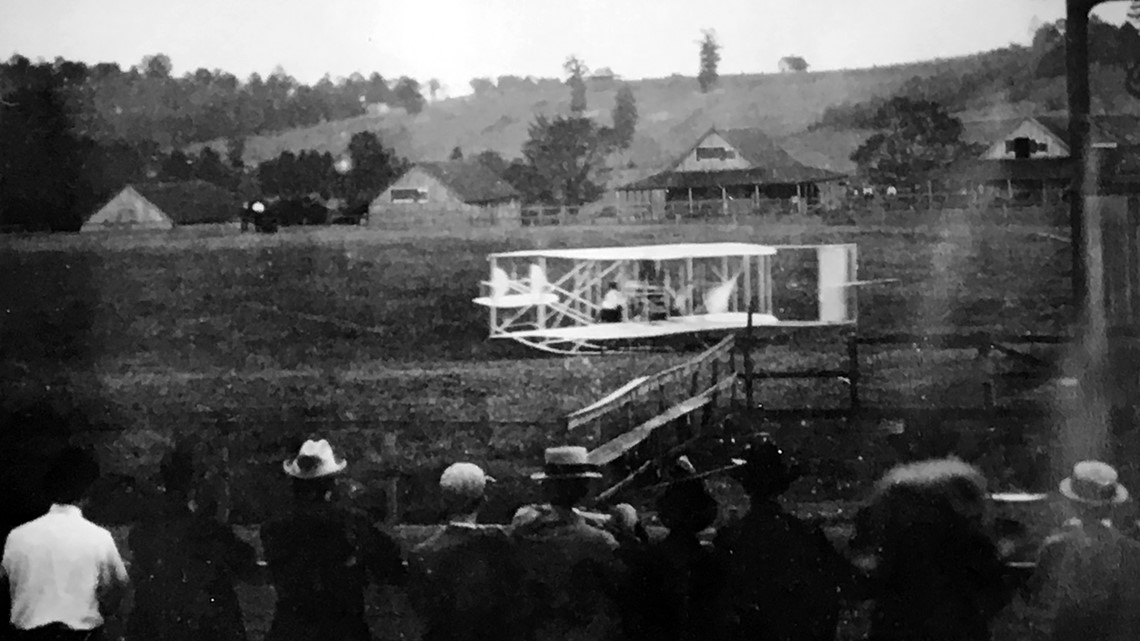
"The first airplane that flew in Knoxville was brought in on the bed of a truck. It circled around and landed on the Cal Johnson race track. So, he's also noted for bringing the first airplane to Knoxville," said Booker.
CIVIC-MINDED CAL
Cal Johnson made a lot of money. He also made a difference in his community. He was elected to city council from 1883-1885. While it may seem remarkable for a Black man to be elected in those days, there were several before him.
"The first two Black city aldermen were elected in 1869. Back then in Knoxville, the Black population was encouraged to vote," said Booker. "Our Black population was so small, they didn't worry about Blacks taking over anything."
Johnson made a fortune on saloons, real estate, and horse racing. He was a man of few words but spoke loudly through philanthropic actions.

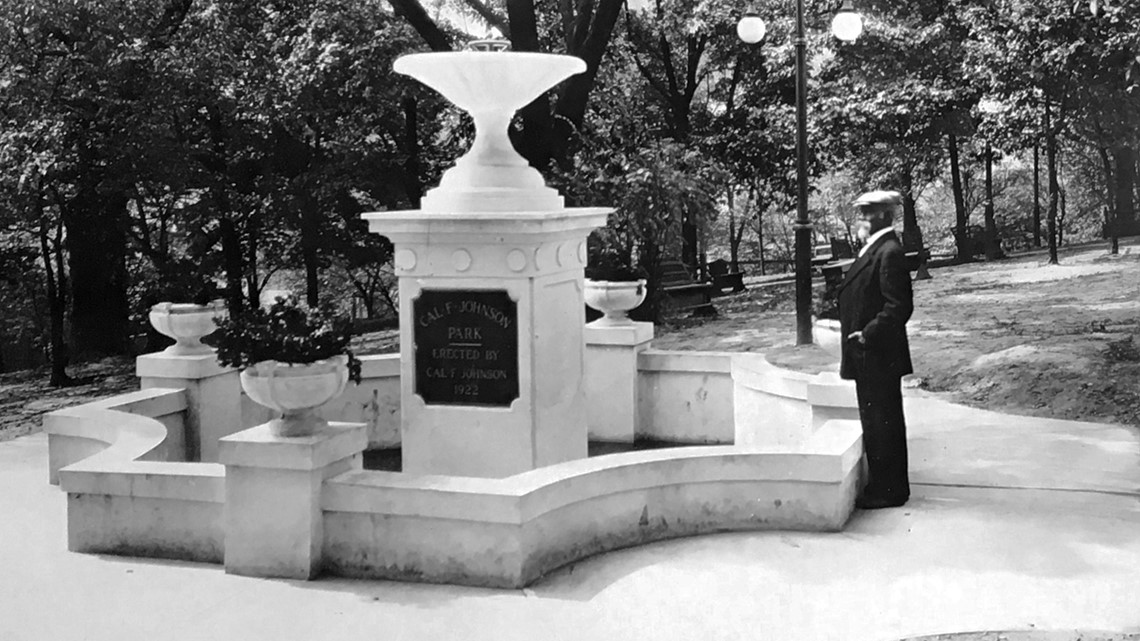
"He donated money to many causes and many times did not broadcast the things he did. He was one of the most humble people you can read about in our history. The colored orphanage would have closed many times if not for Cal Johnson's financial support," said Booker.
Johnson donated the money and property to establish a YMCA for Blacks in Knoxville in 1906.
"He was recognized nationally by the President of the United States for giving the largest gift to the YMCA ever by a Black man in this country," said Booker. "Cal Johnson named the YMCA for his wife, the Alice Johnson YMCA."
Johnson built the Lincoln Theater for Blacks in Knoxville in 1908 and also sponsored a minstrel troop that performed at other theaters in the city.
In the early 1920s, the City of Knoxville budgeted $50,000 to build a city park in the Black neighborhood along what is now Hall of Fame Boulevard. Black residents in Mechanicsville noted they also needed a park, so the city split the budget to build two $25,000 parks. With the sudden budget shortfall, Cal Johnson stepped in to help fund the park near downtown. The city named the park in Johnson's honor.

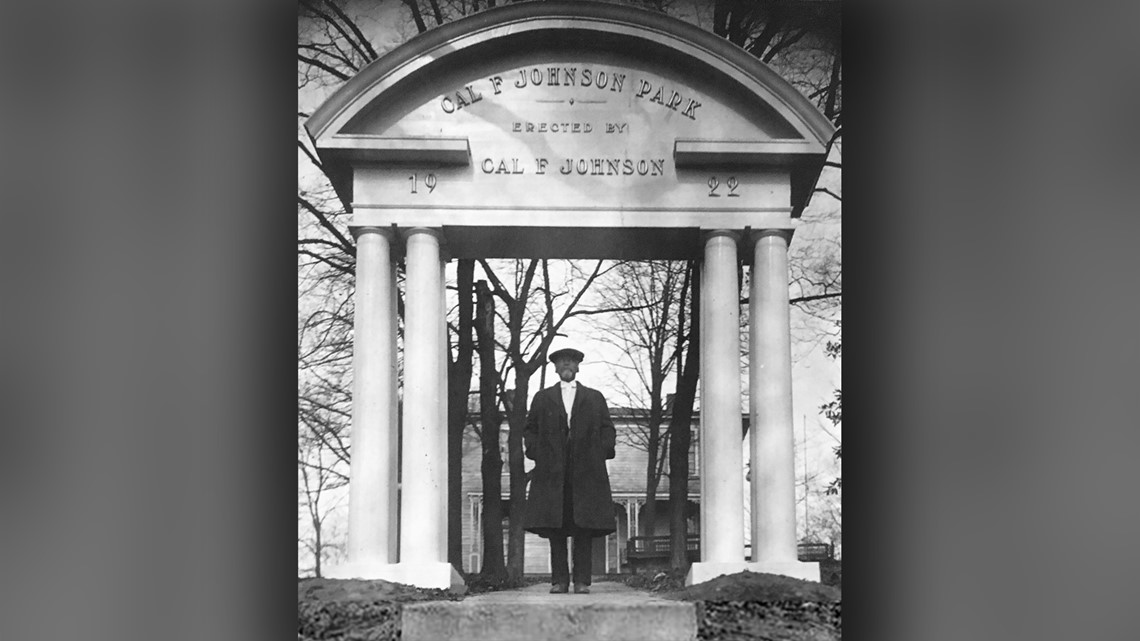
"A lot of people mistakenly think the Cal Johnson donated the land for the park. He did not. The city-owned the property and the city named the park for Cal Johnson. They named it for him because he spent a lot of his own money there putting in electric lights, making sure walkways were proper. He put in a water fountain in the park and also an archway at the entrance to the park," said Booker.
Booker says many people in Knoxville referred to Johnson as "Uncle Cal." He was revered and treated his community like family.
DEATH AND ESTATE
Cal Johnson died in 1925 at the age of 80. His death was covered in newspapers ranging from the Atlanta Constitution to the Boston Globe.
Many articles and websites in the last 25 years refer to Cal Johnson as the state's first Black millionaire. However, newspaper coverage of his death and the subsequent court battles over inheritance valued his estate at $500,000. While Johnson may not have actually been a "millionaire," the man was immensely wealthy for the time and amassed wealth that would exceed $7 million in 2019 when adjusted for inflation.

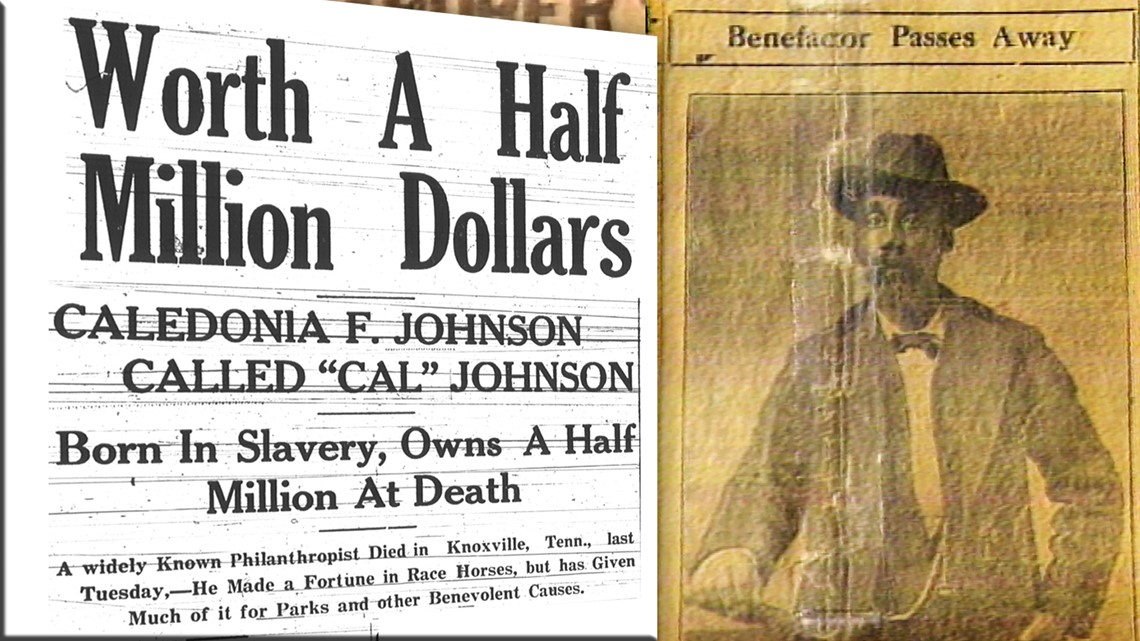
"To try to put a dollar figure on it is very difficult. What we can say with certainty is he was one of the richest Black men in the state of Tennessee and the South. And he made this money from scratch after being born into slavery," said Booker.
Johnson was married twice and had no children. He remarried after the death of his first wife, Alice. His second wife, Maggie Erwin Johnson, inherited his entire estate. She died less than two years later in Jan. 1927.
There were several court battles over Johnson's estate by those claiming to be heirs. Ultimately, the bulk of the money went to the Shiloh Presbyterian Church where Johnson was a member.
Five years after Cal Johnson's death, the same fate found its way to his favorite lone tree on Gay Street. The owner of Lone Tree Shoe Shop, Louis Tobe, worked for years to keep the tree alive. As he said in a 1925 newspaper article, "Cal Johnson wouldn't have that tree cut down for a million dollars. I wouldn't touch it because I like and respect Johnson."

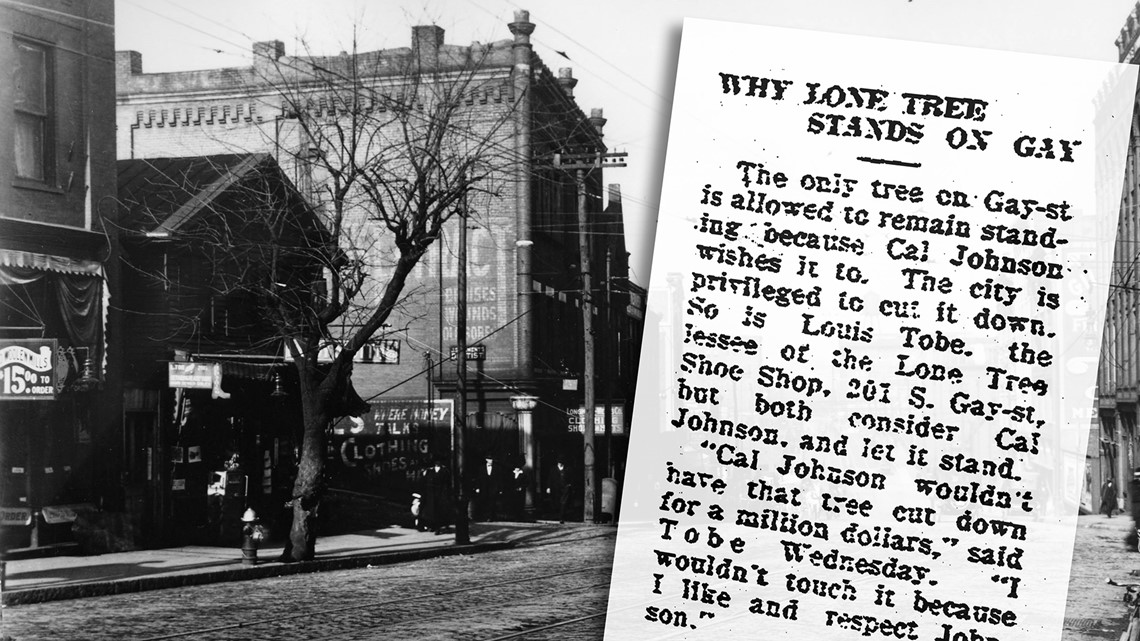
The lone tree finally died from old age "hastened by the pavements, smoke, and crowded buildings" of Gay Street, according to the Knoxville News Sentinel in 1929. It was finally chopped down and left Gay Street treeless in Nov. 1930.
The fountain and archway Johnson donated to the Cal. F. Johnson Park would also eventually come down. The items were removed when the city built the Cal. Johnson Recreation Center building at the park.
A NAME WORTH REMEMBERING
Cal Johnson is buried at the Odd Fellows Cemetery in East Knoxville. The name Calvin Fackler Johnson is chiseled in his headstone. His three-story building on State Street says "Calvin F. Johnson 1898." The short street to access Speedway Circle is named Calvin Street. Yet, newspaper articles at the time of his death said his name was Caledonia Fackler Johnson. Some said he was named for a member of the McClung family that owned his family as slaves.
"His name was Caledonia Fackler Johnson. How he got the name, I do not know. Why there is confusion over his name, I would guess it is because he could not read or write and people likely assumed Cal was short for Calvin," said Booker.

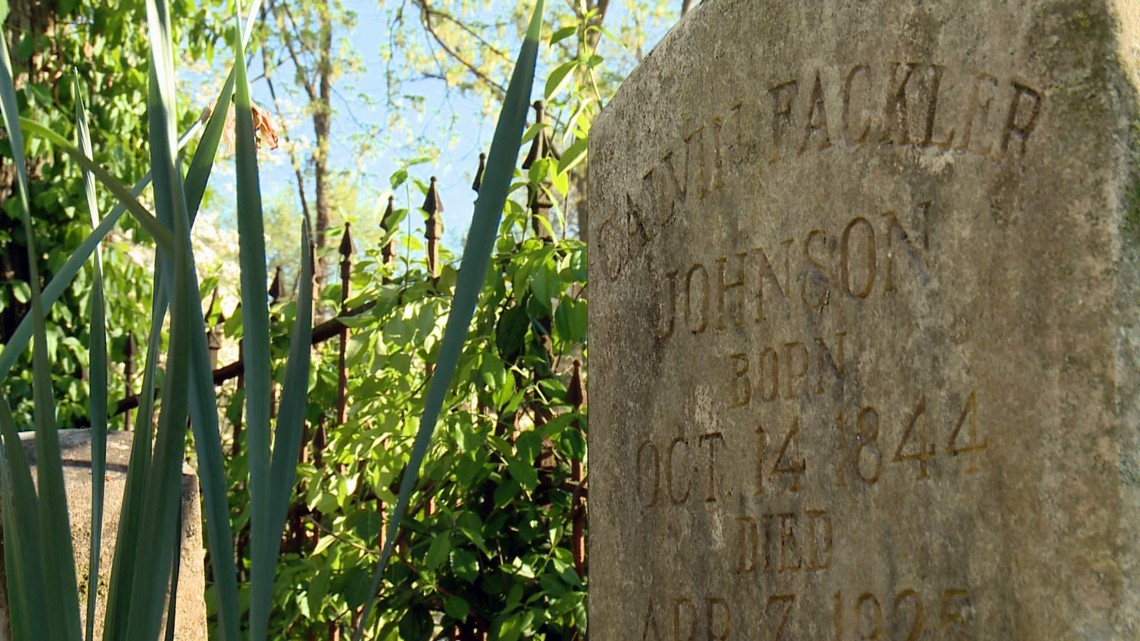
If the name Calvin was a mistake, it is one Johnson probably did not correct. Several articles and the 1920 census indicate Johnson was able to read and write later in life. However, the census records list him as C.F. Johnson without spelling his full name.
Whatever his full name, we know he lived his remarkable life by the name Cal Johnson. The name is still found throughout Knoxville and deserves to be remembered.
"That is the telling story for me with Cal Johnson is, 'I was a slave, yet look what I achieved. Look at what I contributed to my community.' He inspired people to open businesses and pursue their dreams. That is what his legacy is to me," said Booker.

